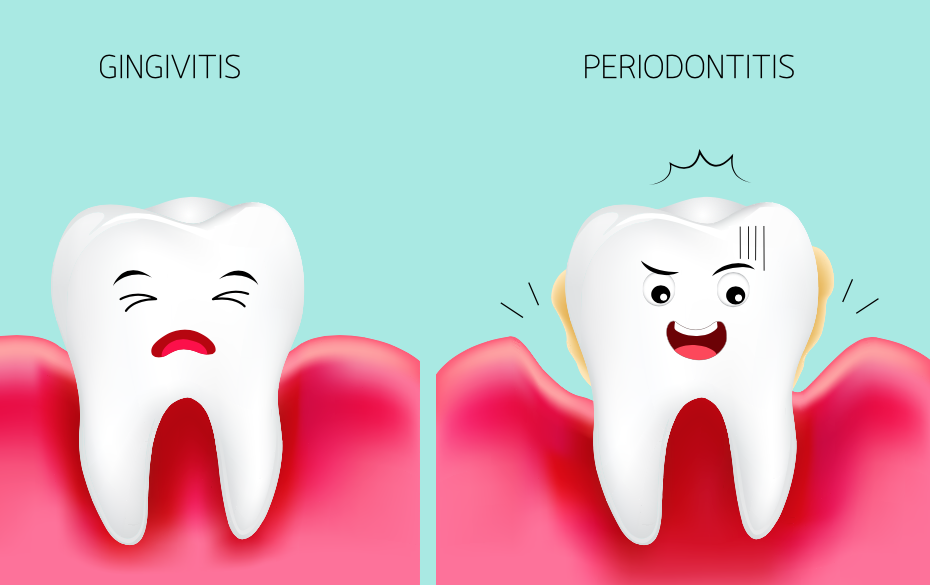What is Gum Disease?
Also called periodontitis, gum disease is generally a condition affecting the gums caused by the buildup of bacteria in the mouth. This is caused by a lack of proper oral hygiene. Gum disease affects the tissues surrounding your teeth and can lead to tissue destruction and loss of teeth. A significant number of people have or have experienced a form of gum disease at some point in their lives. According the Canadian Dental Association, 7 out of 10 Canadians will develop gum disease at some time in their lives. Gums are sensitive and play a significant role in maintaining oral health. Since some gum conditions are painless, you may not be aware of a problem until it worsens. If the problem is left untreated, it may exacerbate, causing various complications such as tender or weak gums, pain, bleeding, loss of teeth, and jaw deterioration. Disease causing pathogens like bacteria from the gums can also cause problems to other parts of the body such as the lungs, heart, and kidneys.
Types of Gum Disease
Gingivitis, also known as gum inflammation, is a minor form of gum disease but may lead to periodontitis. However, not all gingivitis conditions become periodontitis. In the early stages of gingivitis, food matter and bacteria cause the gums to be inflamed. This may cause bleeding when brushing as well as swollen and tender gums. At this stage, no irreversible damage has been done. When this condition is left unattended, it progresses to become periodontitis. Periodontitis is a more serious form of gum disease that may lead to more severe consequences such as loss of teeth.
Causes of Gum Disease
Most gum problems are caused by a lack of oral hygiene. The food we consume carries many disease-causing microorganisms, and a lack of oral hygiene causes the formation of tartar on the teeth after some time. Plaque builds up on the teeth, and if not removed, may harden and develops into tartar. Plaque can be removed by practicing proper oral care such as brushing twice daily, flossing, and having half-yearly professional teeth cleanings. Several factors can contribute to gum disease. They include:
- Smoking
- Dietary deficiency, e.g., vitamin C
- Certain diseases e.g., HIV/AIDS
- Medications that lessen the flow of saliva
- Diabetes
- Hormonal changes in females, including during pregnancy
- Medical treatments such as chemotherapy
Warning Signs of Gum Disease
Though gum disease can go unnoticed for some time, scheduling regular dental appointments at the Upper Hunt Club Dental Centre in Ottawa will help in early detection. Some of the symptoms include:
- Receding gums
- Shifting or loose teeth
- Bleeding gums, especially when brushing or eating
- Prolonged bad taste or breath in the mouth
- Formation of spaces or pockets between teeth and gums.
- Swollen, sensitive, and red gums
Treatment Options Gum Disease
There are several treatment options for gum disease depending on the severity of the problem. Factors that can determine treatment include response to previous treatments and overall health. An ultimate treatment plan is established during a dental appointment after further inspection of the condition. There are non-surgical and surgical procedures used to treat gum disease.
Non-Surgical
When early signs or symptoms of gum disease are discovered, professional teeth cleanings are recommended eliminate plaque and tartar. If conditions are more serious, another option includes scaling and root planning which entails a deep clean of the affected area to remove tartar and plaque below and above the gumline.
Surgical
When gum disease leads to more serious conditions, surgical procedures may be the treatment of choice. Options include:
- Flap surgery
- Soft tissue grafts
- Bone grafts
- Guided bone and tissue regeneration
It is recommended that you visit us at the Upper Hunt Club Dental Centre in Ottawa at least twice a year to assure proper maintenance of your oral health. Preventive dental care can help with early detection of problems including gum disease. When looking for signs and symptoms of gum disease, dentists inspect factors such as teeth movement, inflammation, pocket depths between the teeth and gums, bleeding, sensitivity, teeth misalignment, and firmness. There are several people battling gum disease all over the world. Maintain strong oral health practices and keep up with dental appointments to assure good dental care. If you are experiencing any signs or symptoms of gum disease, contact us to schedule an appointment.













